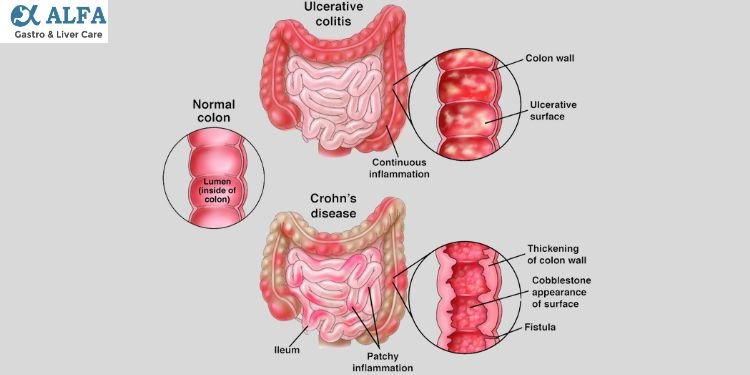Comprehensive Guide to Inflammatory Bowel Disease(IBD): Symptoms, Causes, and Treatment

What is Inflammatory Bowel Disease?
Inflammatory Bowel Disease (IBD) is a chronic condition affecting the digestive system, characterized by persistent inflammation. The two primary types of IBD are Crohn’s disease and ulcerative colitis, both of which can cause a range of symptoms and complications.
Understanding Crohn’s Disease and Ulcerative Colitis
Crohn’s Disease:
- Affects any part of the digestive tract, from the mouth to the anus.
- Inflammation can penetrate deep into the affected tissues.
- Common symptoms include abdominal pain, diarrhea, and weight loss.
Ulcerative Colitis:
- Mainly affects the colon and rectum.
- Inflammation occurs on the surface of the colon lining.
- Symptoms include abdominal cramps, rectal bleeding, and persistent diarrhea.
What are the Symptoms of Inflammatory Bowel Disease?
The symptoms of IBD can vary in type and intensity, making it challenging to diagnose. Common symptoms include:
- Persistent Diarrhea: Frequent and urgent bowel movements.
- Abdominal Pain: Cramping and discomfort in the abdominal region.
- Blood in Stool: Rectal bleeding or blood in the stool.
- Fatigue: Feeling tired and weak.
- Unexplained Weight Loss: Significant weight loss without an apparent cause.
Individuals experiencing these symptoms should seek medical attention promptly for accurate diagnosis and management.
What are the Causes of Inflammatory Bowel Disease?
The exact causes of IBD remain complex and multifaceted, involving a combination of genetic, environmental, and immune system factors. Key considerations include:
Genetics: Family history plays a role in predisposing individuals to IBD.
Immune System Dysfunction: An abnormal immune response may trigger inflammation.
Environmental Factors: Exposure to certain environmental factors, such as diet and infections, may contribute.
Understanding these causes is essential for tailoring effective treatment plans and preventive measures.
What is the Treatment for Inflammatory Bowel Disease?
While there is no cure for IBD, various treatment options aim to manage symptoms, induce and maintain remission, and improve the patient’s overall quality of life.
Medications:
- Anti-inflammatory drugs.
- Immunosuppressants.
- Biologics targeting specific immune pathways.
Lifestyle Modifications:
- Dietary changes, including a low-residue or specific carbohydrate diet.
- Stress management techniques.
- Regular exercise.
Surgery:
In severe cases, surgery may be necessary to remove damaged portions of the digestive tract.
It’s crucial for individuals with IBD to work closely with healthcare providers to develop personalized treatment plans.
Conclusion:
Inflammatory Bowel Disease is a challenging condition that requires comprehensive management. Early detection, accurate diagnosis, and a holistic approach to treatment are vital for improving the quality of life for those affected.
For personalized guidance and expert care in managing Inflammatory Bowel Disease, Dr. Vatsal Mehta at Alfa Gastro and Liver Care, Ahmedabad, is here to help.
Dr. Vatsal Mehta, a distinguished gastroenterologist, leads the team at Alfa Gastro and Liver Care in Ahmedabad. With a commitment to providing compassionate and patient-centered care, Dr. Mehta specializes in the diagnosis and treatment of gastrointestinal disorders, including Inflammatory Bowel Disease.
Contact Alfa Gastro and Liver Care to schedule a consultation with Dr. Vatsal Mehta and take proactive steps toward effective Inflammatory Bowel Disease management.

